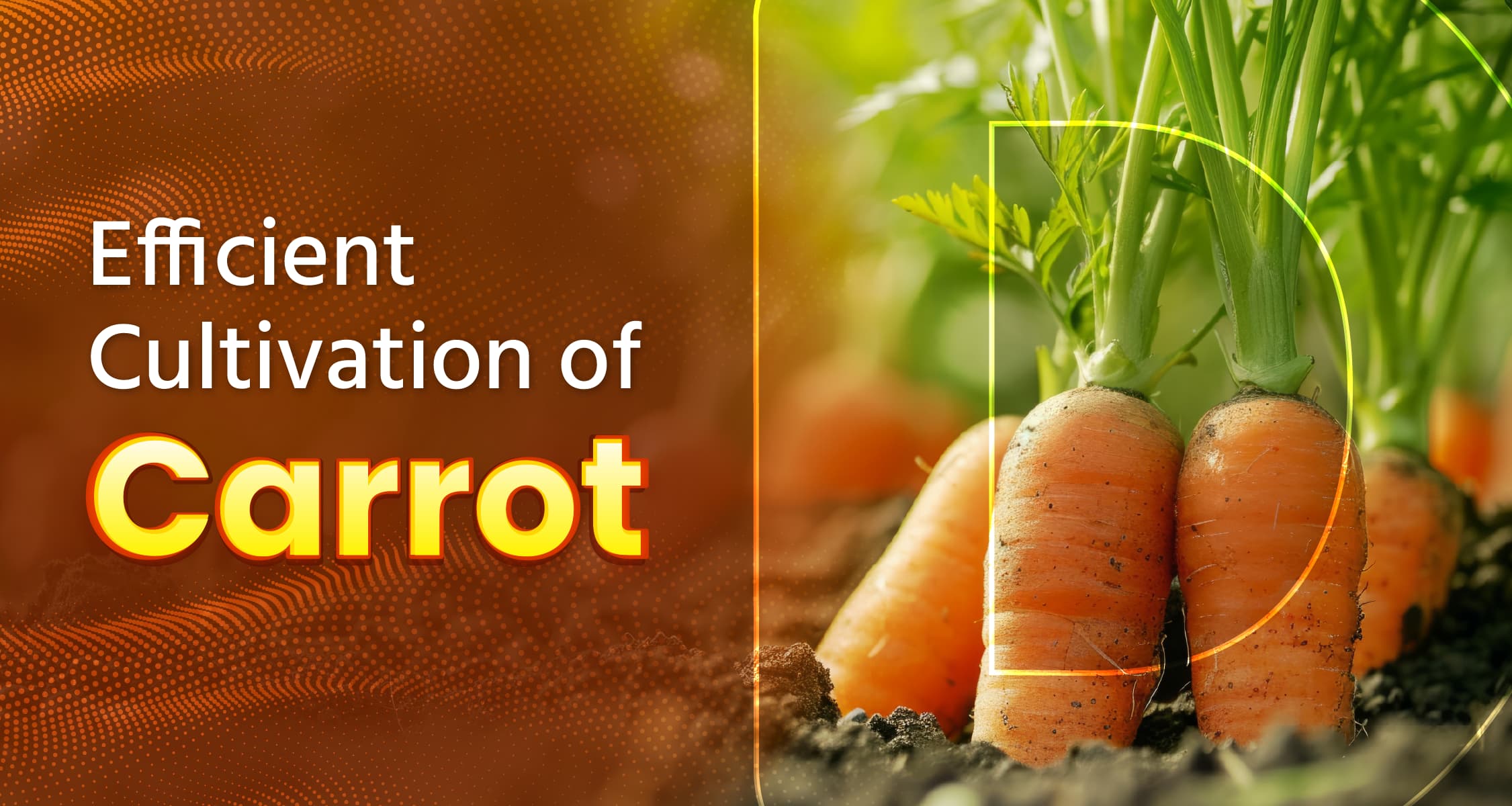Efficient Cultivation of Carrot

Efficient Cultivation of Carrot
Carrot is considered to be a prominent vegetable among root vegetables. It is cultivated in many states of India and Haryana is the top state in terms of its production. Haryana produces 20.23% of the total carrot production of the country. It is also cultivated prominently in West Bengal, Punjab, Uttar Pradesh, Madhya Pradesh, Maharashtra, Karnataka, and Gujarat. Being rich in nutrients like Vitamin A and Beta-carotene, carrots are considered to be quite beneficial for health. It is largely consumed as a salad. Apart from this, food items like halwa, pickles, various dishes, etc are prepared from it. As its cultivation can be a very profitable endeavor for the farmers, some vital things need to be kept in mind to obtain a healthy harvest.
How to Cultivate Carrot?
Suitable Climate: Carrot is a crop that is mainly cultivated in winter climates. The color and growth of its roots depend on temperature. 10-15°C is a good temperature for its growth and color. At higher temperatures the roots become shorter and at lower temperatures the roots become longer and thinner. However, many varieties are also cultivated in summer. So the cultivation time depends on the varieties of carrots.
Selection of Land: Carrots can be cultivated successfully in almost all types of soils. For its better yield, organic loamy soil or sandy loamy soil is suitable. The pH level of the soil should be 6.5.
Sowing Time: The time from August to October is suitable for sowing carrots. Apart from this, you can also sow it in the month of November-December.
Seed Quantity: Seed quantity depends on the variety. Generally, 2 to 2.5 kg seeds are required per acre of field. Before sowing, soak the seeds in water for 12-24 hours. This makes germination easier.
Best Varieties: It is important to select the right seeds for carrot cultivation. Select hybrid seeds as recommended by agri-experts to get high yields and good-quality crops. To get a good yield, one can select 'DeHaat DS Desi Red and DeHaat DS Nantees varieties. Apart from this, you can also choose Shine Brand- Shine Early Nantes Carrot, Tokita Kuroda, Urja- Desi Red Lalima Carrot, Farmson- Nantes F1 Hybrid Carrot, Tokita 3848, Iris- Hybrid Carrot varieties.
Field Preparation: Plow 2-3 times to prepare the field. After plowing, make the soil friable and level it. While preparing the field, mix 40 kg of DAP fertilizer per acre of field. At the time of the last plowing of the field, mix 30 kg Urea, 30 kg Muriate of Potash (MOP), and 4-5 kg Zinc Sulphate per acre of field. Make proper arrangements for drainage in the field. To get a good yield, get the soil tested before using fertilizer in the field.
Sowing Method: At the time of sowing seeds, there should be an adequate amount of moisture in the field. Carrots can be sown in small flatbeds or on ridges. Maintain a distance of 11-18 inches between all beds/ridges. There should be a distance of about 2-3 inches between plants. Sow the seeds at a depth of 1 to 2 cm.
Irrigation: Irrigation is done depending on the moisture present in the soil in the crop. If there is less moisture in the field at the time of sowing seeds, then light irrigation should be done after sowing. This facilitates germination. Try to avoid water logging conditions from arising in the field. If there is a water logging situation in the field, the possibility of fungal diseases increases. In cold weather, irrigate at an interval of 10 to 12 days. Stop irrigation 2-3 weeks before digging.
Weed Management: Carrot plants grow slowly. Therefore, it is necessary to remove weeds in the initial stage of the crop. To get rid of weeds in the field, carry out weeding as necessary. Carry out the first weeding 20-25 days after sowing and the second weeding activity after 40-45 days after sowing. Apart from this, you can also keep the crop free from weeds by using weedicides/herbicides. You can use 1,200 ml Pendimethalin 30% EC (UPL Dost) per acre of field within 24-48 hours of seed sowing.
Disease and Pest Management: Carrot crops are more prone to pests and diseases like carrot weevil, termite, leaf spot disease, root rot disease, etc. These diseases and pests can become a major reason for the reduction in carrot yield. To protect the crop from these diseases, keep inspecting the field continuously. If symptoms of any disease or pest are observed, use appropriate chemicals.
Harvesting of Carrot: The time of maturity of carrot crops may vary according to their variety. Generally, the carrot crops are ready for digging after 90-100 days of sowing. Carry out light irrigation before digging as this makes it easier and can prevent the carrots from breaking. Use tools like a trowel or spade for digging. Wash the carrots with clean water properly after harvesting.
Which variety of carrot do you cultivate and how much yield do you get from it? Tell us your answers and experiences through comments. For agriculture-related information, you can also consult agri-experts by calling DeHaat's toll-free number 1800-1036-110. Also, don't forget to like and comment on this post. For more such information, follow the 'Krishi Gyan' channel now.
Frequently Asked Questions (FAQs)
Q: Which fertilizers can be used in carrot cultivation?
A: DAP, Urea, Single Super Phosphate, Muriate of Potash, and Zinc Sulphate should be used in carrot crops. The amount of fertilizers depends on the nutrients present in the field. Therefore, get the soil tested before using any kind of fertilizers to have better results.
Q: How many days does it take for a carrot seed to grow?
A: Carrot seeds take about 8 to 10 days to grow.
Q: Should carrot seeds be soaked before sowing?
A: It is not necessary to soak carrot seeds before sowing. However, soaking the seeds before sowing can improve the germination process. Carrot seeds have a hard outer layer that makes the time taken for water to penetrate a bit more and then the seed to germinate. Soaking the seeds in water for a few hours or overnight softens the outer layer and improves germination.
Please login to continue

Get free advice from a crop doctor
